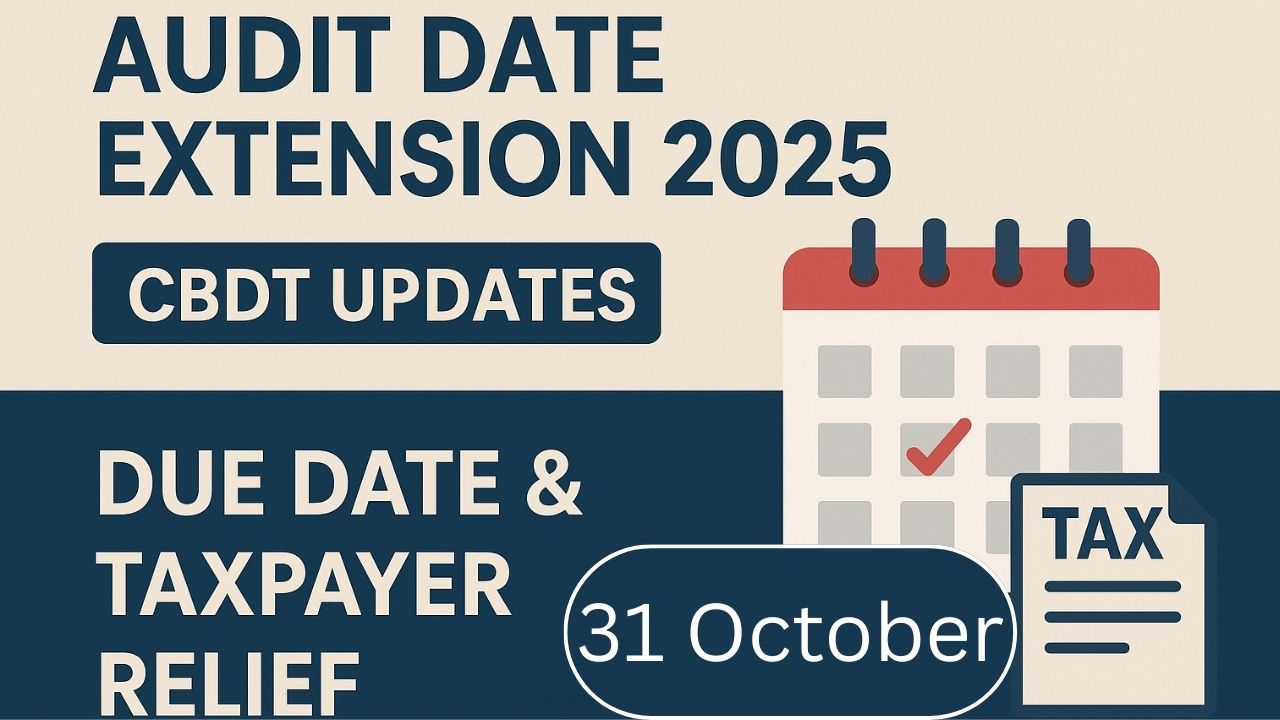Get the latest updates on Audit Date Extension 2025. Learn why CBDT extended the due date, who benefits, legal basis, implications, risks, and compliance steps for taxpayers.
Introduction
The Audit Date Extension 2025 has been one of the most important tax compliance updates for businesses and professionals in India. The Central Board of Direct Taxes (CBDT) recently extended the due date for filing various audit reports. This decision provides much-needed relief to taxpayers who faced technical glitches, delayed utilities, and natural disruptions. In this article, we will discuss the background of the extension, legal framework, benefits, risks, and compliance tips for taxpayers.
For more updates click on Smart Bharat Manch
Background of the Audit Date Extension 2025
Initially, the audit deadline was 30 September 2025. After multiple representations by professional bodies such as ICAI and directions from High Courts, the CBDT extended the due date to 31 October 2025.
This extension ensures that businesses, professionals, and auditors get additional time to complete the audit process without penalties or defaults.
Legal Basis of the Extension
- The extension applies to audit reports under the Income Tax Act, specifically clause (a) of Explanation 2 to Section 139(1).
- Several High Courts, including the Rajasthan High Court, directed the CBDT to extend the date.
- The CBDT press release confirmed the new timeline for Assessment Year 2025-26.
-For confirmation click on Official PIB Notification
Who Benefits From the Extension?
- Businesses and professionals whose accounts are required to be audited under Section 44AB.
- Chartered Accountants and audit firms who get more time to finalize audit reports.
- Taxpayers in affected regions dealing with floods or portal issues.
Non-audit taxpayers are not directly affected. Their ITR filing deadlines remain separate.
Benefits of Audit Date Extension 2025
- Avoids penalties and defaults by giving taxpayers sufficient time.
- Improves audit quality by allowing thorough verification.
- Reduces load on the income tax portal, preventing last-minute crashes.
- Provides relief to professionals managing multiple clients.
- Reduces litigation risk by ensuring timely and accurate filing.
Risks and Limitations
- The extension is only for audit reports, not necessarily for all ITR forms.
- Courts have granted only a limited extension (till 31 October 2025).
- Frequent extensions may encourage late compliance culture.
What Tax payers Should Do
- Track CBDT notifications for final confirmation.
- Plan audits early to avoid last-day rush.
- Coordinate with auditors to finalize books and reports.
- Ensure portal readiness by testing upload utilities.
- Maintain documentation of audit work to stay compliant.
Extended Analysis: Why Timely Audits Still Matter
Even though the audit deadline has been extended, businesses must not assume unlimited time. Timely audits help in several ways:Audit Date Extension 2025
- Better financial planning: Audits highlight strengths and weaknesses in financial reporting, which helps management take early corrective action.
- Loan and funding requirements: Banks and investors often ask for updated audited accounts. A delayed audit may create hurdles in raising funds.
- Tax planning: Early completion of audits ensures better tax-saving strategies before final return filing.
- Reputation and compliance score: Regular and timely audits improve the credibility of businesses in the eyes of regulators, investors, and customers.
Thus, while the Audit Date Extension 2025 provides relief, it should be used wisely to improve compliance rather than delaying work unnecessarily.
Long-Term Perspective
Over the last decade, the CBDT has extended audit and ITR deadlines multiple times due to external factors such as technical glitches or natural disasters. Audit Date Extension 2025 While this demonstrates flexibility, it also highlights the need for stronger digital infrastructure and better preparedness by both taxpayers and authorities.
Going forward, businesses should adopt digital accounting solutions, cloud-based data management, and automated compliance tools. This will reduce dependence on extensions and ensure that audits can be completed smoothly even within the original timelines.
Conclusion
The Audit Date Extension 2025 is a welcome step for businesses and professionals facing practical challenges in meeting deadlines. With the due date now shifted to 31 October 2025, taxpayers have additional time to ensure compliance. However, this extension should not be seen as a reason to delay work but rather as an opportunity to improve accuracy, strengthen documentation, and reduce the risk of penalties.
In the long term, India’s tax system will benefit from stronger digital infrastructure and proactive compliance culture. Businesses should aim to complete their audits early and treat the extension as a cushion, not a crutch.

